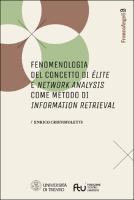Fenomenologia del concetto di élite e network analysis come metodo di information retrieval
| dc.contributor.author | Cristofoletti, Enrico | |
| dc.date.accessioned | 2022-05-31T14:14:27Z | |
| dc.date.available | 2022-05-31T14:14:27Z | |
| dc.date.issued | 2022 | |
| dc.identifier | ONIX_20220531_9788835140344_45 | |
| dc.identifier | OCN: 1348375056 | |
| dc.identifier.uri | https://library.oapen.org/handle/20.500.12657/55778 | |
| dc.language | Italian | |
| dc.relation.ispartofseries | Fondazione Trentino Università | |
| dc.subject.other | criteria for good conceptual definitions | |
| dc.subject.other | citation network | |
| dc.subject.other | elite | |
| dc.subject.other | information retrieval | |
| dc.subject.other | review methods | |
| dc.subject.other | concept reconstruction | |
| dc.title | Fenomenologia del concetto di élite e network analysis come metodo di information retrieval | |
| dc.type | book | |
| oapen.abstract.otherlanguage | According to Sartori, “Language is the sine-qua-non instrument of knowing”. Nevertheless, social sciences often adopt terms lacking clear and precise definitions. Adopting the method proposed in Sartori (1984), the present Master’s thesis consists of an explicatory study aiming to clarify the concept of “elites”. First, the essential works concerning elites are identified by analyzing a large citation network. Then, the thesis proposes a definition of elite able to encompass those of previous works. The new definition attempts to include the concept of elites within the broader framework of the resource-dependence theories (Pfeffer e Salancik, 1978) and purposive theories (Coleman, 2005). | |
| oapen.relation.isPublishedBy | e2ddfb5e-9202-4851-8afe-1e09b020b018 | |
| oapen.relation.isFundedBy | 71038aa7-d8bb-45b8-a25e-fcf27fa05968 | |
| oapen.relation.isbn | 9788835140344 | |
| oapen.pages | 205 | |
| oapen.place.publication | Milan | |
| oapen.grant.number | [...] |

